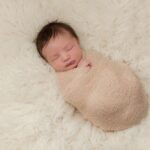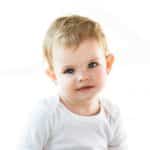Diaper changes and newborn care go hand-in-hand, which becomes the heroic act of good parenting.
Good parenting becomes waking up in the middle of the night with your little one, and having a baby in the household is a big task for the entire family.
Don’t worry if all you can think about is how much you can’t wait for a full night of sleep – without any diaper changes.
You aren’t alone. Many parents with babies have the same vision, them sleeping through the night, no diaper changes, no hungry baby at 2:00 am, to wake up feeling fully rested.
Yet, when this time comes for every parent varies – even within a single household it can vary – maybe mom gets up the baby more than dad does from the start, or the other way around.
Either way, one parent ends up getting up with their baby more often than the other parent.
But beyond these reasons, parents might truly be wondering when the diaper changes will end on their baby’s parts. When will your baby naturally stop needing those nightly diaper changes?
This special under-valued time your baby stops needing a diaper change throughout the night is when everyone in your house gets to rest regardless of your role as a parent.
Each baby will stop needing diaper changes throughout the night at a different time
All babies are slightly different when it comes to no longer needing to have their diaper changed throughout the night. Each child’s body is a little bit different in terms of how long they can hold their bladder and bowels.
You may have one child that stops needing nightly diaper changes early on while the other needs to have their diapers changed often.
This is the case for many parents multiples. They end up thinking their 2nd child will end up following the same pattern as their first child, only to find out their children are nothing alike in terms of diaper changes or potty training.
On average, babies use the most diapers when they reach size 2, which usually begins at 14lbs of weight and ends around 18lbs (7-months).
If your baby follows this pattern, it’s unlikely that you will discontinue nightly diaper changes between this time frame.
By 11 months of age, most babies have more awareness of having their diaper changed. Some babies will even resist their diaper being changed beginning at 11-months of age.
How will I know when my baby doesn’t need a diaper change at night?
View in gallery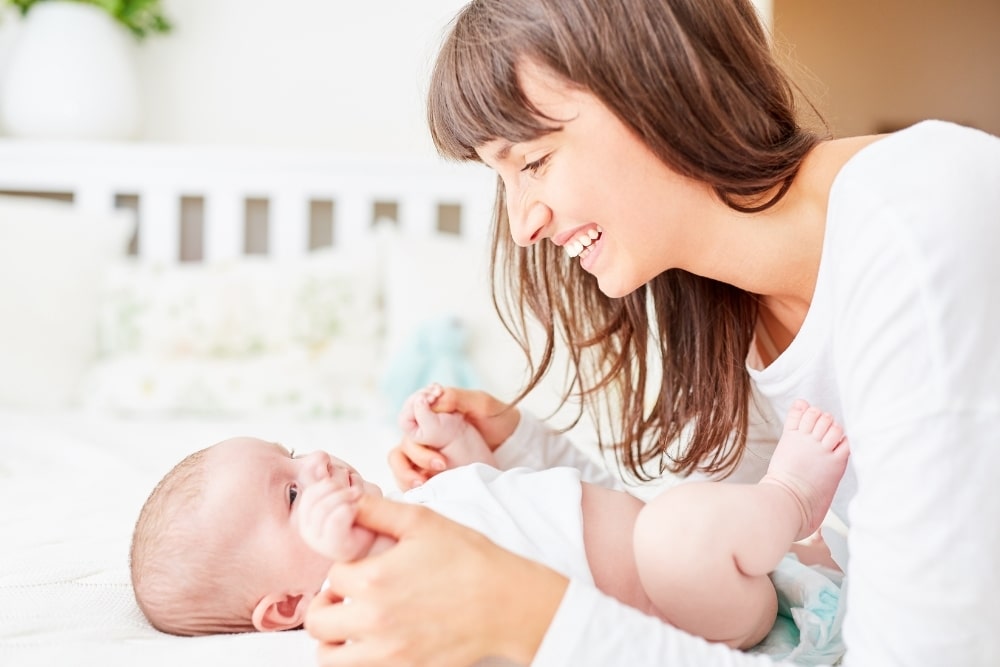
If your baby doesn’t need nightly diaper changes, then you’ll probably notice that their skin isn’t nearly as sensitive as it was when they were firstborn.
One reason that parents need to change their newborn’s diaper at night is due to their baby’s sensitive skin – delicate skin will chaff and acquire diaper rash more easily.
If your baby is passed size one diapers and seems to have skin that doesn’t get irritated with a bit of trapped moisture from a diaper – they might be able to go all night without being changed.
When a baby is first born their poop is a sticky substance called meconium
Meconium is a sticky black, green, or tar-colored substance that your baby will expel the first week after birth.
During the newborn phase, your baby needs to be changed as soon as possible, since meconium is so sticky you will have a hard time wiping it away from the longer your baby waits to be wiped clean.
Sometimes during the newborn stage, you will end up changing your baby’s diapers a few times in an hour. This is definitely not the time to leave your babies diaper on overnight.
At this stage, you will probably change your baby’s diaper every time your baby drinks breastmilk.
Meconium is made up of dead cells, amniotic fluid, and various other substances consumed during the time they were in the womb.
Do certain brands of diapers hold more waste than other brands?
Yes, certain brands of diapers will hold more urine and fecal matter than other diapers.
You might find that your baby can sleep through one brand of diapers, while another brand only offers a few hours of coverage for your little one.
And then there are diapers specifically made for overnight coverage. If your baby’s skin can withstand staying in one diaper all night long, these overnight diapers are a great option to ensure a diaper holds all of the waste.
You can put cream on your babies bottom before bed if you know that you probably won’t be having a diaper change all night
[amalinkspro type=”showcase” asin=”B082QBB8KQ” apilink=”https://www.amazon.com/dp/B082QBB8KQ?tag=mominformedcom-20&linkCode=osi&th=1&psc=1″ new-window=”true” addtocart=”false” nofollow=”true” sc-id=”4″ imgs=”LargeImage” link-imgs=”false” specs=”Aquaphor Baby Diaper Rash Paste, enriched with Shea Butter, provides immediate soothing relief in just one application~~~Use Diaper Rash Paste on more troublesome rashes and anytime exposure to wet diapers may be prolonged~~~Formulated with maximum strength 40% Zinc Oxide that intensively treats diaper rash and creates a barrier to protect your baby’s irritated skin” btn-color=”#ff9900″ btn-text=”Check Price” alignment=”aligncenter” hide-prime=”0″ hide-image=”0″ hide-price=”0″ hide-button=”0″ width=”750″]Aquaphor Baby Diaper Rash Paste[/amalinkspro]
Diaper creams offer long-lasting protection against the irritation that attributes to diaper rash and yeast infections.
Apply some of this cream right before bed when you’re putting on your baby’s last clean diaper and pajamas for bedtime.
Yeast and rashes are common when a baby has the same diaper on throughout the night. You can give your baby a morning bath instead of one before bed to wash off any urine, or yeast-causing bacteria upon waking up.
Should I change a poopy diaper that my baby has after being put to bed?
If your baby goes poop after laying down for bed, even if they’ve already fallen asleep you should absolutely wake your baby for a diaper change. No person of any age should have to sit in a poopy diaper all night long.
Poop sits in between your baby’s bottom and the diaper, while the material of the diaper absorbs most of the urine repelling it away from your little one’s skin.
This means that the bulk of the poop is against your baby’s skin once your baby goes #2. Your baby might take a while to put back to sleep, but at least there will not be fecal matter against their delicate skin all night.
Aside from protecting your baby’s skin by changing a poopy diaper right away, you are eliminating an awful-awful smell that you will have to endure the next morning when you change your baby.
Of course, we aren’t perfect as parents and can be unaware of a poopy diaper randomly. You shouldn’t feel bad about it!
Signs that your baby is ready to keep the same diaper on all night long
Now, if it seems completely unnatural to decide when your baby is ready to sleep through the night in the same diaper then you can look to more confirming milestones that your baby will surely reach at some point in time.
Sometimes it can be tricky to decide because some nights your baby may have a dry diaper upon waking, and then not do that again for another few weeks.
So you may celebrate thinking they have hit the milestones of having a dry diaper all night long when they haven’t really.
On the other hand, some toddlers still have wet diapers even though they are completely capable of deciding to go on the toilet instead of their diaper.
You wouldn’t keep changing older toddlers throughout the night – regardless of still having wet diapers.
View in gallery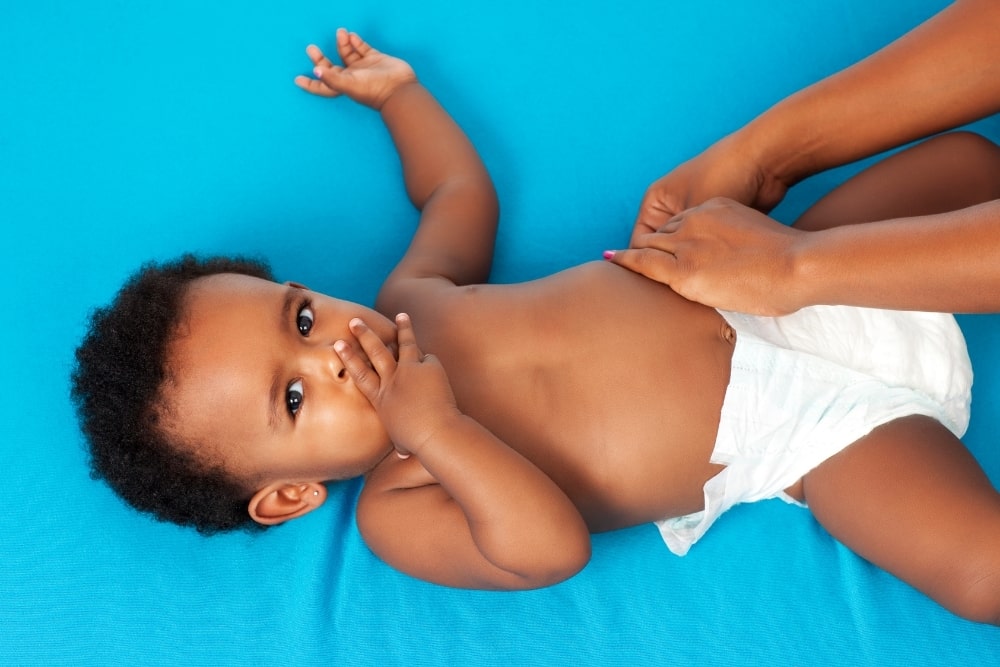
Your babies age is a big part of the decision toward no nightly diaper changes
Keep in mind that daytime control of the bladder doesn’t happen until around 2-years-old and nighttime bladder control won’t happen until around 5-6-years-old.
This means that you can’t expect your baby to keep a dry diaper or pull up all night long until after 6-years-old. Your baby might have a few dry diapers throughout the night randomly before the age of 6, but don’t expect this to last.
If your baby has dry diapers and then reverts back to having wet diapers again throughout the night before they turn 7-years-old don’t become worried, this is completely normal.
Milestones will come and go, until one day they stick for good. Your baby should be able to stay in their diaper throughout the night with wet diapers by a year old at the latest.
If your baby turns 1-years-old you can choose to let your baby stay in their diaper throughout the night.
Does your baby soak their diaper every night still?
If your baby suddenly stops urinating throughout the night, you can go ahead and stop changing their diaper at night but don’t give up diapers at night consistently, just yet.
Sometimes babies will stop going pee in the middle of the night, then a few weeks later start up again.
The thing is that you don’t know when your baby will suddenly start going again, so if you throw out the diapers at the first sign of your baby staying dry throughout the night you may end up with soaked sheets.
It’s okay to discontinue changing your baby’s diaper at night if they stop waking up in soaked diapers all of the time, this is a sign that their bladder has grown sufficiently.
Has your baby been pooping in a diaper in the middle of the night?
If your baby has pooped frequently throughout the night, you should absolutely keep changing their diapers. This means that their bowels and their eating schedule are demanding to be kept up with throughout the night.
Generally, the time frame where babies are pooping throughout the night is during the newborn stage but it can happen later on as well during growth spurts.
View in gallery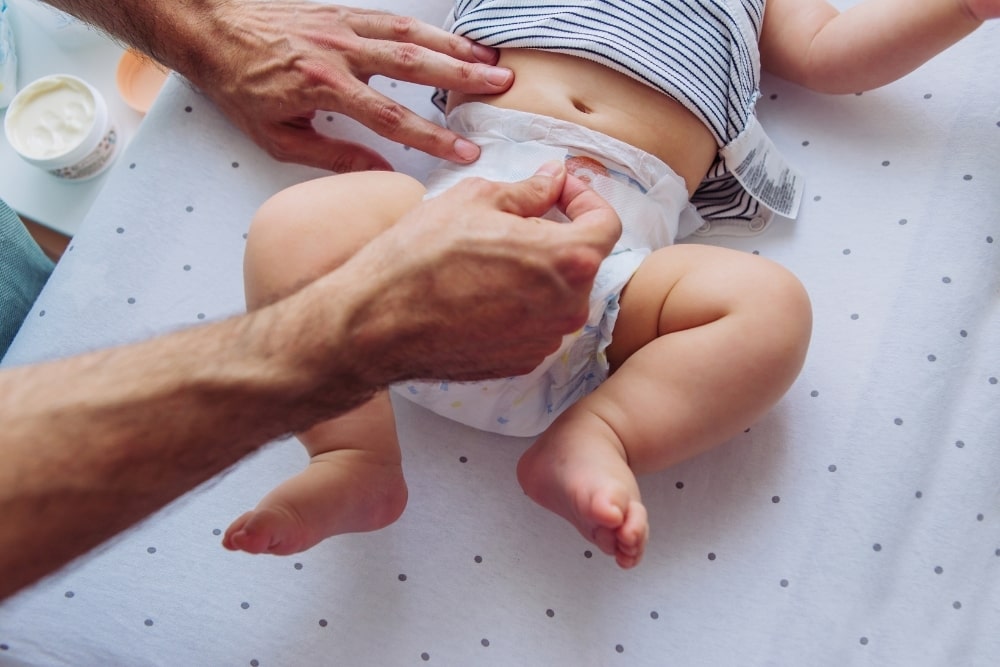
On the other hand, once your baby stops pooping at any time throughout the night is a good time to let them sleep without waking them for a diaper change.
Are nighttime feedings still common or does your baby wait until waking to have milk or solids?
If your baby is still breastfeeding throughout the night, you can be sure that diaper changes are still necessary – if the diapers tend to be overfilled upon waking.
As mentioned above you can purchase diapers that are meant to last overnight – this will help keep your sheets or your baby’s bedding dry.
The more milk your baby drinks the more urine that will be produced, you may need to keep changing your little one’s diapers purely to avoid diaper overflows every night.
Does your child’s skin break out, accrue yeast rash, or diaper rash easily?
If your baby has extra-sensitive skin at any time, then you will want to consider changing diapers throughout the night to avoid breakouts.
Yeast rash thrives in moist warm environments like such as soiled diapers – a bacteria produces excess yeast which causes a yeast infection.
Diaper rash is slightly different than yeast rash and happens when the skin beneath your babies diaper is irritated from the extra moisture in your babies diaper
In Conclusion
It’s up to every parent individually when they decide to stop changing their child’s diaper through the night, based on a number of factors.
You’ll have to ask yourself a few questions about your baby’s behavior, physical abilities, and how they act when you change their diaper in the middle of the night.
When it comes down to it, as long as your baby isn’t sleeping in a poopy diaper all night long or waking up with diaper rash – it’s a good time to allow your baby to sleep in the same diaper overnight.
It’s really based on what your family can manage regarding caring for the toddler or baby in your household.

